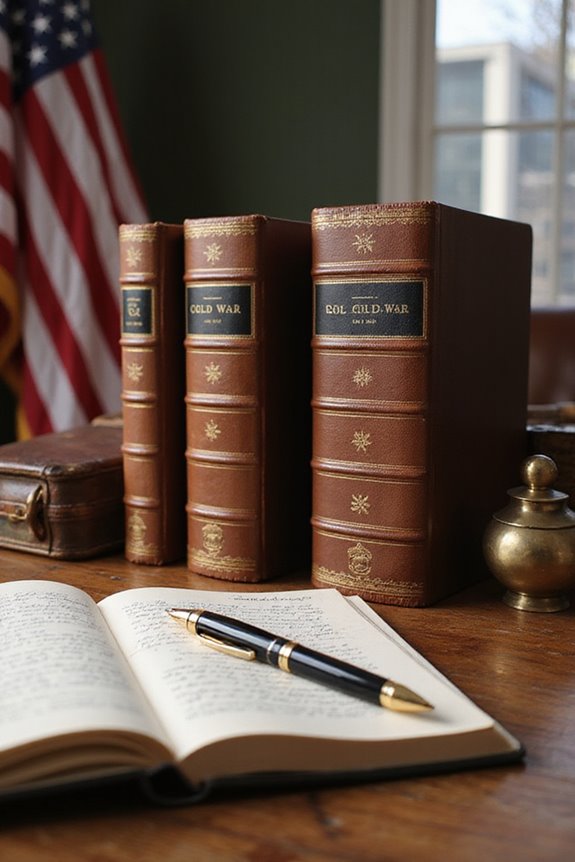If you’re looking to enrich your understanding of political history, we recommend several key books that everyone should consider:
- *The Ideological Origins of the American Revolution* by Bernard Bailyn emphasizes revolutionary ideas.
- *Making Democracy Work* highlights civic engagement’s role in democratic performance.
- *The Woman’s Hour* showcases the grassroots activism behind women’s suffrage.
- Biographies like *Lincoln’s Melancholy* provide insight into leadership dynamics.
These works collectively enhance our grasp of political systems and social movements, offering valuable perspectives. Exploring further reveals even more essential insights.
Key Takeaways
- *The Ideological Origins of the American Revolution* offers insights into revolutionary ideas that shaped American political thought and governance.
- *Making Democracy Work* emphasizes the importance of civic engagement in fostering stable democratic regimes globally.
- *The Woman’s Hour* illustrates grassroots activism’s crucial role in the women’s suffrage movement and broader political advocacy.
- *Democracy in America* provides a detailed analysis of American political structures, focusing on the balance between equality and liberty.
- Biographies like *Benjamin Franklin* and *Mandela: The Authorized Biography* reveal influential leadership qualities that impact political history and movements.
Key Political Histories of the United States
When we examine the key political histories of the United States, it’s clear that several foundational works have shaped our understanding of the nation’s political evolution.
- *The Ideological Origins of the American Revolution* by Bernard Bailyn emphasizes the importance of revolutionary ideas over economic factors, influencing modern policy debates. This work highlights the marginalized voices that often shaped the revolutionary narrative, challenging mainstream perspectives.
- Richard White’s The Middle Ground explores early political negotiations between Native Americans and colonists, highlighting complex alliances. This negotiation process illustrates the significance of mutual accommodation among diverse groups in shaping early American politics.
- Ideological conflicts, such as those between federalists and anti-federalists, are central to understanding political institutions, particularly through The Federalist Papers and Anti-Federalist writings. These foundational texts provide insight into the intentions of the Founders and their impact on contemporary governance models.
Together, these works illustrate the intricate tapestry of U.S. political history, essential for understanding today’s political landscape.
Global and Comparative Political Histories

Furthermore, Making Democracy Work reveals how civic engagement impacts democratic performance and regime stability. By examining these foundational works, we can better grasp the complexities of political institutions and their effects across different nations. Understanding these dynamics is essential for anyone interested in the nuances of political systems and their development globally. Additionally, the study of democracy and dictatorship highlights the importance of civic traditions and political culture in shaping political outcomes. Furthermore, the exploration of electoral integrity sheds light on the critical role that fair representation plays in the health of democracies.
Histories of Political Movements and Social Change

Histories of political movements and social change reveal the dynamic interplay between society and its political structures. These histories highlight significant milestones in activism, particularly in women’s suffrage and labor movements.
- Women’s Suffrage: Works like *The Woman’s Hour* by Elaine Weiss showcase grassroots activism leading to the 1920 ratification of the 19th Amendment, emphasizing the complexity of this struggle. Additionally, the fight for women’s suffrage was shaped by the influence of women’s political advocacy that laid the groundwork for future campaigns. This struggle resonates with themes explored in *Democracy Awakening*, which critiques the erosion of democratic values and underscores the importance of grassroots activism in protecting democratic principles.
- Labor Movements: Books like *Red State Revolt* document union strikes, highlighting how grassroots organizing can influence broader political discussions. The importance of such movements is echoed in *Fight*, which delves into the role of party conflicts and election dynamics, reinforcing how organized efforts can reshape political landscapes.
- Resistance Literature: Texts on anarchism emphasize revolutionary tactics that challenge state authority, demonstrating how oppressed populations can instigate social change.
Collectively, these narratives illustrate how movements leverage grassroots activism and revolutionary tactics to achieve significant political and social transformations.
Biographies and Studies of Political Leadership

Understanding political movements and social change helps us appreciate the pivotal role of leadership in shaping these events. Biographies and studies of political leadership provide insights into the leadership qualities that drive influential figures. Here are some essential reads:
- Benjamin Franklin by Walter Isaacson: Highlights Franklin’s contributions and political influence in American history. This biography showcases the complexities of political influence and how Franklin navigated them.
- Mandela: The Authorized Biography by Anthony Sampson: Examines Nelson Mandela’s remarkable leadership qualities and impact on South Africa.
- Leadership by Henry Kissinger: Analyzes effective leadership through historical examples, reflecting Kissinger’s experiences.
- Lincoln’s Melancholy by Joshua Wolf Shenk: Discusses how Lincoln’s psychological challenges shaped his leadership during the Civil War.
These works illuminate the complexities of political influence and the essential traits of effective leaders throughout history. Additionally, studying figures like Alexander Hamilton can offer valuable lessons on leadership applicable to all leaders.
Foundational Political Novels

When exploring the landscape of political thought, foundational political novels stand out for their ability to reflect and critique societal structures. These works often incorporate utopian visions and incisive political satire, making them essential reading.
Key foundational novels include:
- Utopia by Thomas More: Imagines an ideal society, critiquing contemporary systems.
- The Prince by Niccolò Machiavelli: Discusses power and statecraft, laying groundwork for modern political theory.
- Gulliver’s Travels by Jonathan Swift: Satirizes human nature and government through fantastical tales.
- Candide by Voltaire: Critiques political institutions and optimism, shaping Enlightenment thought.
- Democracy in America by Alexis de Tocqueville: Analyzes American political structures and the balance between equality and liberty. Political fiction often critiques existing societies and presents alternative realities, enriching the exploration of these foundational texts. The themes of political theory and critique found in these novels resonate with contemporary political discussions and reflect enduring questions about governance.
These novels provide valuable insights into political ideologies and human behavior, shaping our understanding of governance.
Frequently Asked Questions
What Are the Main Themes in Political History Books?
When we explore political history, we uncover themes of power dynamics and ideological conflicts. Understanding these elements enriches our perspective, highlighting how authority shapes societies and the struggles that arise in pursuit of justice and freedom.
How Do Political History Books Influence Current Political Thought?
Political history books shape our current thought by providing historical context and revealing ideological frameworks. They challenge our perspectives, informing our understanding of power dynamics and encouraging critical engagement with contemporary political issues and governance models.
Are There Any Political History Books Focused on Non-Western Perspectives?
Absolutely, we can explore political history books that focus on non-Western perspectives. Works emphasizing Postcolonial Perspectives from the Global South reveal unique insights into histories shaped by colonialism, resistance, and the complexities of contemporary political landscapes.
What Criteria Should I Use to Choose a Political History Book?
When choosing a political history book, we should prioritize author credibility and thematic relevance. This guarantees we’re engaging with accurate perspectives while exploring diverse narratives that enrich our understanding of historical events and their complexities.
How Have Political History Books Evolved Over Time?
We’ve seen political history books evolve considerably, adapting narrative styles to reflect historical context. From classical foundations to contemporary global perspectives, they now weave complex stories that engage diverse audiences in understanding our political past and present.






